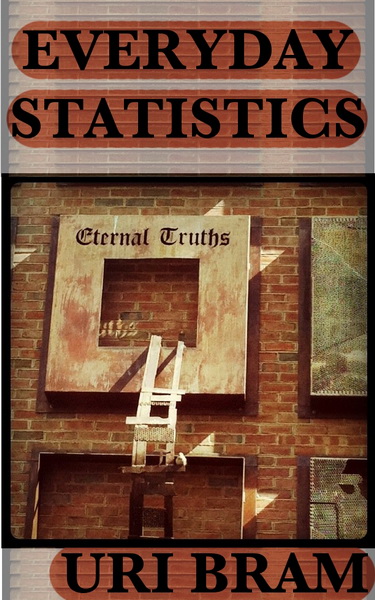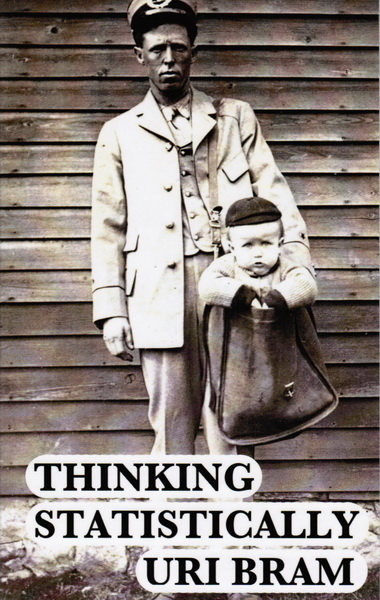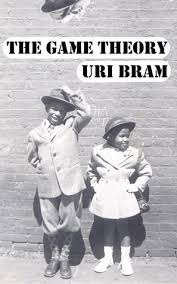


Uri Bram writes popular books with a conceptual, visual approach to statistics. Bram believes that it is possible to learn statistical concepts without understanding statistical techniques, and that the concepts on their own can be a huge help for students when examining and interpreting the world around us.
Contact Uri at uri@uribram.com. Check out his homepage.
Statistics Books:
Everyday Statistics
by Uri Bram (www.everydaystats.com) [Forthcoming]
Everyday Statistics is the book that makes introductory probability and statistics simple, accessible and engaging for high school and college students of all ages. Its clear, visual presentation brings usually confusing statistical topics alive for students; engaging examples, cute stories, and relatable subject matter make key statistical topics more fun and more memorable; detailed, step-by-step explorations of often-confusing calculations help even struggling students to feel completely comfortable.
Table of Contents:
-
Probability
- Probability Space
- Conditional Probability
- Independent Probability
-
Centres and Spreads
- Averages
- Standard Deviations
-
Distributions
- The Binomial Distribution
- Understanding Distributions
- The Normal Distribution
Excerpts:
“Our story begins with randomness. More precisely: our story begins by cleverly dodging how exactly to define randomness, an incredibly slippery and mind-blowing concept that much smarter people than us spend a long time arguing about. (Throughout this book, we will in fact be cleverly dodging the dirty details while we get our heads around the key intuitions behind the big ideas in statistics).”
“The problem in statistics (and in all subjects, really) is that once you get to be an Incredibly Knowledgeable Expert, it’s easy to forget just how many of the ‘basic’ concepts are completely unintuitive until you know them. It’s far too easy to find statistics classes where the material feels difficult because the basic concepts are just assumed to be obvious.”
Thinking Statistically
by Uri Bran and Katie Hsih
“This book will teach you how to think like a statistician, without worrying about formal statistical techniques. Along the way we learn how selection bias can explain why your boss doesn’t know he sucks (even when everyone else does); how to use Bayes’ Theorem to decide if your partner is cheating on you; and why Mark Zuckerberg should never be used as an example for anything.”
Thinking Statistically (First edition: October 2011; Current edition: February 2013)
Topics covered: Selection Bias, Endogeneity, and Bayes' Theorem
Excerpts:
“There are lots of valid things we can say about a population from a smaller sample of it, if that sample is truly random. There are even lots of valid things we can say about a population if our sample is biased in some systematic way that we understand and correct for. The real problems occur when our sample is biased and we fail to account for that.”
“Sherlock Holmes said that ‘when you have eliminated the impossible, whatever remains, however improbable, must be the truth’;* what he was really saying was that, ‘If P(E|Hothers)=0, H1 is correct even if P(E|H1) is very small.’ (Why that phrasing didn’t go in the Holmes books is a mystery only to me).”
“If you see a piece of social science reported in the media, one of your first questions should probably be ‘is there an endogeneity problem here?’ This is not necessarily the first question you should ask about social science research in general, but there seems to be a kind of endogeneity problem with the kind of social science that gets reported in the media, namely that the kind of papers that make it into the news are unusually likely to suffer from endogeneity problems. To a stats nerd, this passes as pretty funny.”
Reviews:
- John Haigh — Emeritus Reader (Mathematics), University of Sussex: “This whimsical slim volume … uses simple examples to illustrate its points, largely eschews equations, and can be comfortably absorbed inside an hour. ‘Less is more’ is well exemplified in its forty-odd pages … just as literature enthusiasts will re-read favourite books, despite knowing the characters and plot inside-out, so readers can revisit this book to appreciate its messages, delivered with charm and good humour.”
- Brian Clegg — PopularScience.co.uk: “This is a delightful little book … excellent both as providing a bit of understanding for those making use of statistical methods (it’s all too easy to just crank the handle without understanding what you are doing and thereby come up with the wrong results) and as an introduction for the general reader … a very readable little book.”
- Josh Kaufman — NYT Bestselling author of The Personal MBA: “Thinking Statistically explains essential concepts in statistics with wit and flair. Instead of page after page of mathematical mumbo-jumbo, Uri Bram tells stories that clearly illustrate the core ideas. The math is there, but the illustrations make each formula easy to follow and remember.”
The Game Theory
by Uri Bran
The Game Theory is a light-hearted look at the world of dating through the lens of economic theory. If you’ve ever wondered about the ups and downs of playing hard-to-get; how to give gifts that will actually be appreciated; or why your partner isn’t willing to hang up the phone first, this is the book for you. It will help you find love, learn economics, and (almost) certainly find love through learning economics. Don't play the dating game without The Game Theory.
Reviews:
-
Five Stars. I learned things!
By Hannah on February 8, 2013.
“I very much enjoyed this. It's readable on one plane flight, and you'll learn a little about game theory (I mean, I'm very non-confident with math/theory, but he really dumbs it down to make it understandable) and a little about dating, maybe, too. and a little about gift-giving… which you probably need. And it made for a few good conversations in the days after I read it!” -
Five Stars. He's done it again!
By D. Allen on November 23, 2012.
“Anyone who has read Uri's first book Thinking Statistically will know how he has the capacity to bring humour and insight to bear on the seemingly mundane. Well, he has done it again! This is a short book but I read it at one sitting (and was nearly late for a meeting!)- I was so absorbed. Who would have thought that leggings played such a large role in life? Where else would you get a deep understanding of Games Theory based on the films of Hugh Grant (and Colin Firth)? At several points I laughed out loud - but, here's the thing: I now understand much more about Games Theory than I did when I sat down to read the book (and possibly also quite a lot more about the dating habits of young men) - and it did not hurt one bit. Buy this book now - and buy the first book too. You will not be disappointed.”



